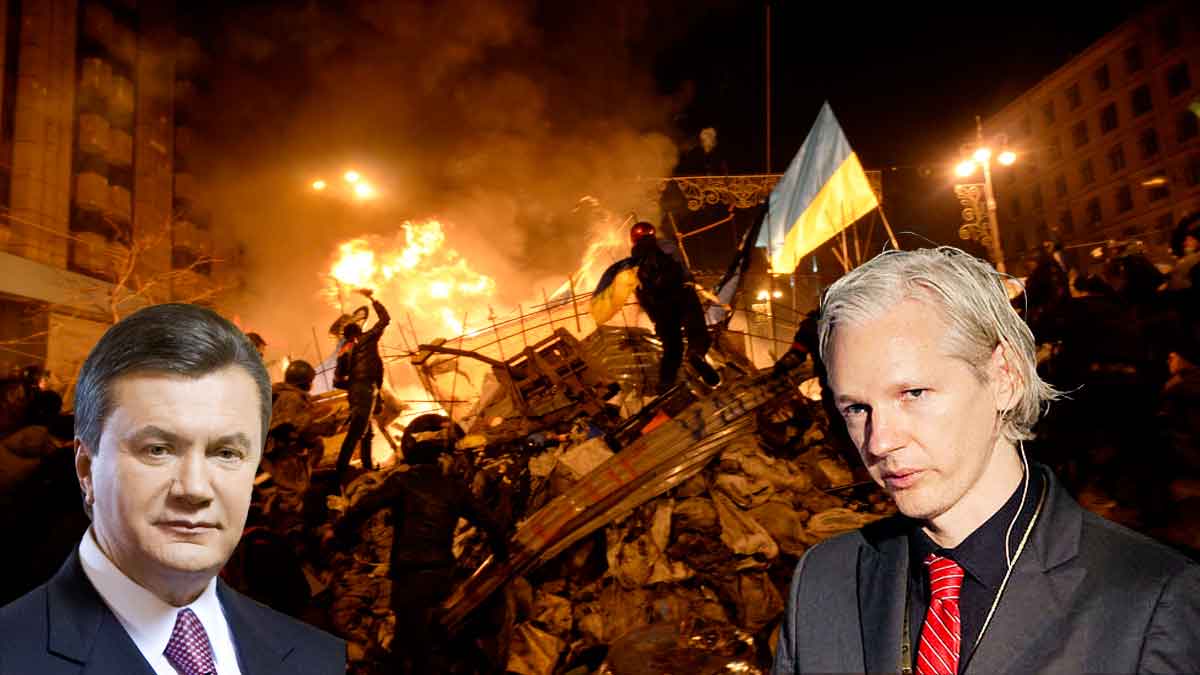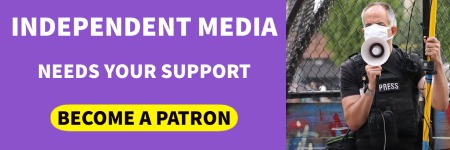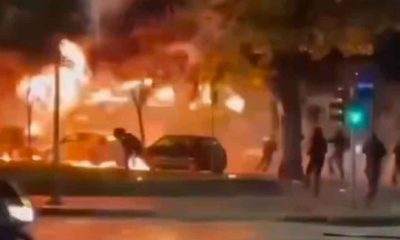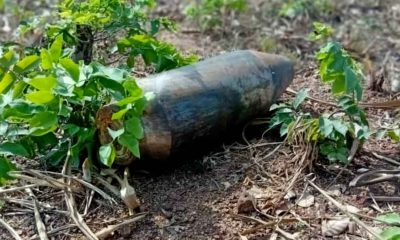International News
Wikileaks Reveals Ukraine Didn’t Want to Join NATO
Confidential documents from the State Department reveal Ukraine had no aspirations to join NATO.

The Kremlin and the Trump White House, along with their proxies, have repeatedly claimed that a key driver of the Russia-Ukraine War was Ukraine’s desire to join the NATO Alliance.
Tucked away among the over 10 million documents released by Julian Assange’s Wikileaks is a confidential cable dated 25 November 2009 between Kyiv-based U.S. State Department Political Counselor Colin Cleary and Washington, D.C. The cable was sent to the Commonwealth of Independent States, NATO—European Union Cooperative, and Secretary of State Hilary Clinton.
There are 13 paragraphs, including one about NATO Alliance membership, one about joining the European Union, and one about continuing military support for Georgia, which came under partial Russian occupation in August 2008.
Cleary’s cable is an outline of Viktor Yanukovych’s potential foreign policy if he won the 2010 presidential election in Ukraine and what Kyiv’s position would be on a number of geopolitical issues. Cleary met with Anatoliy Orel, a Senior Advisor to Yanukovych, in Kyiv, and on 10 February 2010, Yanukovych became Ukraine’s president.
The memo speaks for itself. Orel told Cleary that a Yanukovych administration would adopt a new foreign policy.
- A reset in relations with Russia, generally deferring to Russia’s red lines
- Extending the lease at the Port of Sevastopol in Crimea to the Russian Black Sea Fleet
- Non-bloc status and an end to Ukraine’s NATO membership aspirations
- Relations with the European Union on “equal terms” but without membership
- Cooling of relations between Ukraine and Georgia
- A “pragmatic” relationship with the U.S.
On Russian and Ukrainian Foreign Relations
According to the confidential cable, Orel “condemned” the policies of then-president Viktor Yushchenko, who took a “black-and-white” approach to foreign policy: Russia, bad, and the West, good. He went on to stress that “Ukraine has to take the views of Russia very seriously. Hostile relations with Russia are not in Ukraine’s interest.”
During Yushchenko’s administration, then-Ukrainian Foreign Minister Borys Tarasyuk drew up a list of the “thorniest” issues between Moscow and Kyiv. The most critical issues were “border demarcation [with Russia – Ed.] and the Black Sea Fleet.” No progress was made, and Orel said as the foreign policy head, he would work on “getting the best deal he can for Ukraine. Further, he went on to say that Russia did not want to resolve border issues and was “concerned about the Kerch Strait/Azov Sea being open to NATO ships and thus wants to keep the border unresolved.”
On Joining NATO and Other Alliances
Cleary wrote that Orel “asserted” that “NATO membership ‘makes no sense’ for Ukraine,” adding that “The public is overwhelmingly against it.”
He cited The U.S. War on Terror and Operation Enduring Freedom, which Orel rightly predicted would “end in Vietnam-like failure for the Alliance.” Yanukovych’s team was also concerned that pursuing NATO membership would “needlessly complicate relations with Russia.”
At the time of the meeting with Cleary, Ukrainian troops were already deployed in Afghanistan as part of the International Security Assistance Force. The multinational military mission was active between 2001 and 2014. Ukrainian forces then transitioned to a non-combat role in Operation Resolute Support, which was responsible for training the National Army of Afghanistan. In June 2021, President Volodymyr Zelenskyy withdrew the last 21 Ukrainian soldiers from Afghanistan, ending a 14-year deployment.
Publicly, Yanukovych said he supported cooperation with the NATO Alliance but would not seek membership. Orel and MP Leonid Kozhara, who both worked during the Leonid Kuchma presidency from 1994 to 2005, said that Kuchma “had improved cooperation with NATO in far more practical ways that [sic] Yushchenko ever had.”
Yanukovych was true to his word, maintaining the International Peacekeeping and Security Centre at the Yavoriv Military Base, which opened in 2007 but never advanced NATO membership. The training facility was created under the Ukraine-NATO Partnership for Peace program, which Ukraine joined in February 1994.
In November 2015, Fearless Guardian II, a “combined training between Soldiers from the Joint Multinational Training Group (JMTG-U) – Ukraine, Ukrainian Land Forces, and Ukrainian Special Operations Forces,” started. The California National Guard, 173rd Airborne Brigade, 10th Special Forces Group, and training support personnel from U.S. Army Europe and the Joint Multinational Training Command led the exercise. In total, five battalions were trained.
Orel also told Cleary that under Yanukovych, Kyiv “should” walk away from a Polish-led initiative to join the Eastern Partnership. Warsaw wanted to create a regional agreement with Latvia, Lithuania, Estonia, and Ukraine to “create a cordon around Russia” that Yushchenko believed was “irritating to Russia.” In July 2009, the two nations established a limited agreement to ease travel between the Polish-Ukrainian border for residents who lived within 30 kilometers of the boundary.
When it came to Georgia, both Orel and Kozhara told Cleary that Ukraine would “cool relations.” At the time, Russia occupied approximately 20% of Georgia after its unprovoked invasion in August 2008. When Russia first occupied the Abkhazia and South Ossetia regions, Yanukovych publicly supported the “recognition of the “independence” of the two republics.
During the November 2009 meeting, Orel and Kozhara assured Cleary that this would not happen because the “recognition of South Ossetia and Abkhazia would send the wrong signal” and it would be “going too far to appease Russia.”
In fact, after Yanukovych became president in 2010, he did not stop arms sales to Georgia and never recognized the independence of Abkhazia and South Ossetia.
European Union Membership
Two days before the meeting between Cleary and Orel, region economic chief Mykola Azarov told U.S. embassy staff that “economic reform in Ukraine should come from within and need not be driven by harmonization with the [European Union] (E.U.).” Orel believed that the E.U. would never allow Ukraine to become a full member because the nation’s agricultural and industrial resources would be the largest in the bloc, and it would “undercut prices in Europe.”
Azarov wanted to set a course that would establish bilateral trade with the E.U. and believed that having to comply with a long list of reforms with no assurance of membership was “demeaning.”
At the time of the meeting with Cleary, the E.U. and Ukraine were operating under a Partnership and Cooperation Agreement and had already started broader negotiations to forge an Association Agreement (AA). The AA was approved in March 2012, putting Ukraine on a path to E.U. accession. Later that same year, E.U. Commissioner for Enlargement and European Neighbourhood Policy Stefan Fule stated that the AA and the Deep and Comprehensive Free Trade Area (DCFTA) agreements could be signed in November 2013 if Ukraine complied with additional reforms.
The Fallout
The cable published by Wikileaks aligns with almost all of the events from 2010 to 2014 and reveals that, under Yanukovych, Ukraine had no plans to seek NATO Alliance membership.
It was in 2012 when Russia started its active hybrid war against Ukraine, driving a political and social wedge between the industrial east and the cosmopolitan west. The State Department cable and history support that Moscow’s real issue was Kyiv’s desire to join the E.U. What remains unclear is what changed during the opening months of the Yanukovych administration, which led Kyiv to embrace a path towards a deeper economic relationship.
Russia expanded its coercion in August 2013, starting a trade war by restricting imports and dramatically increasing soft power influence within Ukraine. Three months later, Lithuanian diplomats said Yanukovych changed his mind on E.U. accession because of blackmail over imports and exports, natural gas, and jobs. On 21 November, Yanukovych suspended further efforts to join the E.U. and canceled the signing ceremony for the DCFTA, which was scheduled for the 28th in Vilnius.
Widespread protests erupted across Ukraine, with Yanukovych’s government getting increasingly violent, deploying the Berkut, a cross between riot police and a goon squad. In 2023, around the time of the failed Prigozhin Insurrection in Rostov-on-Don, multiple Russian milbloggers revealed that Russian soldiers were involved in cracking down on the protests, working in cooperation with the Berkut and Yanukovych’s government.
Kyiv passed oppressive anti-protest laws on 16 January 2014. Increasingly violent clashes continued, including the death of several protesters later in the week. Demonstrators occupied multiple government buildings across Ukraine. In an attempt to defuse the situation, the Rada repealed most of the anti-protest laws. Azarov, who was now the prime minister, resigned on 28 January.
By then, Moscow was controlling the anti-Maidan with support from Berkut, its own military operatives, and mercenary supporters. Yanukovych was also under the control of the Kremlin, which intended for him to be a puppet who would control Ukraine as a rump state. On 20 February, almost 100 protesters were killed in Kyiv after the Berkut and snipers opened fire. Thirteen police officers also died, and hundreds were wounded.
On the same day, Russian soldiers invaded the Crimean Peninsula, and a contingent of Russians, including FSB Colonel Igor “Strelkov” Girkin, traveled to Donetsk in the Donbas to meet with pro-Russian elements within the region. Girkin would go on to be the first Minister of Defense of the so-called Donetsk People’s Republic and lead the 1st Army Corps.
Prior to his arrest by Russia in the summer of 2023 for violating Moscow’s “don’t say war” laws, Girkin confessed that he was the instigator of the warfare in the Donbas. A claim backed up by the now-deceased leader of the former Private Military Company Wagner Group, Yevgen Prigozhin. Russian milblogger Seymon Pegov also revealed in September 2022 that he was fighting under the leadership of Girkin in Slovyansk and Kramatorsk and condemned Girkin for “abandoning him” during the collapse of the Russian offensive.
On 21 February 2014, Yanukovych signed an agreement forming an interim government and reinstating the 2004 Constitution. Hours later, the Berkut and police withdrew, and protesters took control. The next day, Yanukovych tried to flee to Russia through Kharkiv but was stopped by border guards. Two days later, he fled to Moscow on a Russian military flight out of occupied Crimea.
Ukraine did not seek NATO membership until April 2022, and the atrocities committed by Russian forces in the Kyiv suburbs of Bucha and Irpin were revealed to the world. At the end of the Biden administration in 2024, it was revealed that Washington never intended to permit Ukraine to join the NATO Alliance, along with Germany and Hungary. The White House was worried that even the offer of an invitation to NATO would provoke Russia into potentially attacking the NATO Alliance or using tactical nuclear weapons in Ukraine.
Wikileaks exposes that almost 14 years of attempts to appease Moscow by Washington, Kyiv, and Brussels were all in vain. Moscow had already destabilized Belarus and Georgia, with the latter currently falling deeper under the control of the Georgia Dream regime.
You can read the 25 November 2009 State Department cable on Wikileaks.








